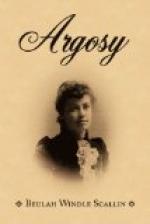Enclosed within it was also a fragment of music. Unrolling the parchment, I proceeded to decipher with difficulty this narrative.
“On the Wednesday
evening before Easter, A.D. 1686, I, John Gibson,
was called to the bedside
of Master Jenkins.
“He had manifested a wish to hold converse with me, and to see me concerning some matters in which we had both been engaged. He had suffered grievously for many days, and it was plain to all his friends that he had not long to tarry with us. A right skilful player upon the organ was Master Jenkins, and a man beloved of all. He had written much music for the Glory of God and the edification of his Church, wherein his life seemed mirrored, for his music appealed to men’s hearts and led them to serve God, as did also the example of his blameless life and conversation among us. He had been busied for some time in the writing of a Service for Easter Day, in the which he designed to express the thoughts of his waning years. I had been privileged to hear some of these sweet strains, and do affirm that finer music hath never been written by any man in this realm of England. The Italians do make much boast of their skill in music, and doubtless in their use of counterpoints, fugues, and divers other devices they have hitherto excelled our nation; but I doubt if Palestrina himself could have written more excellent music, or have devised more cunning harmonies than those of Master Jenkins.
“The work had of late been hindered by the pains of sickness, for the master’s eyes were dim with age, and his hands could scarce hold pen; and so I, his most intimate friend, had on sundry occasions transcribed his thoughts as he related them.
“On receiving his message I forthwith hastened to the presence of my friend, and was sore troubled to find him in so grievous a plight. It was plain to all beholders that his course was well-nigh run, for a great change had taken place even in the last few hours.
“He revived somewhat on seeing me, and begged me at once to fetch paper and ink. ‘I am going,’ said he, ’to keep Easter in my Lord’s Court; but ere I go, I fain would finish what hath been my life’s work. Then shall I rest in peace.’
“There was but
little time, and so I made haste to fetch pen and
paper, and waited for
his words.
“Never, I trow, hath music been written before at such a season as this. We were finishing the last movement—the Creed, and those words went direct to my heart as they had never done before. I could scarce refrain from weeping, but joy was mingled even with tears, for the light upon the master’s face was not of earth, and there was a sound of triumph in his voice which told of conflict well-nigh ended and rest won.
“We had come to the words ’I believe in the resurrection of the dead, and the life of the world to come.’ For the




